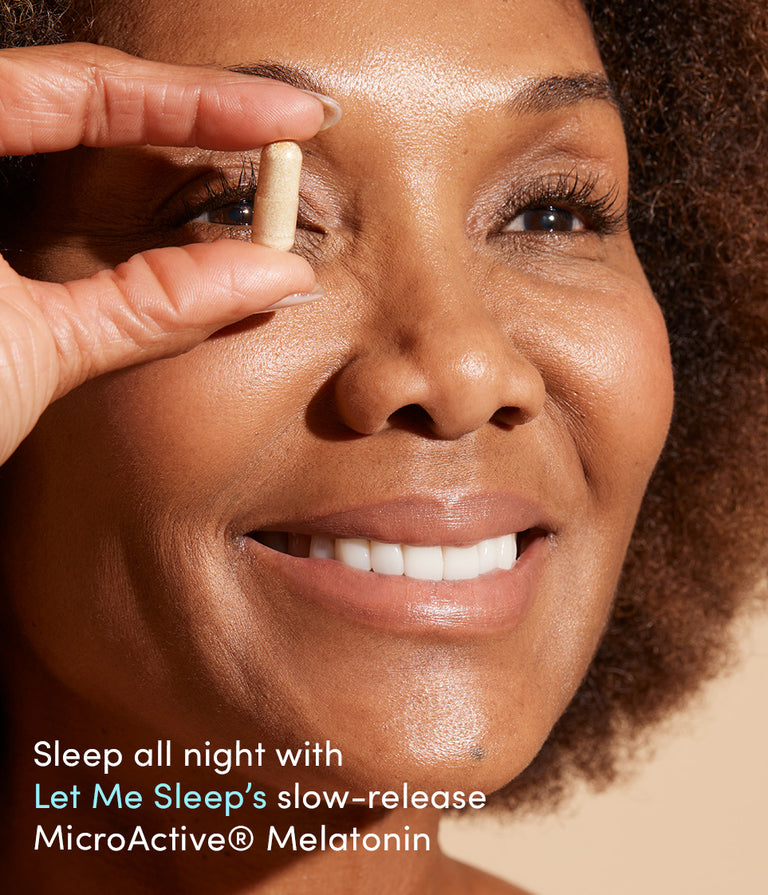By Julia Walker, RN, BSN 4-Minute Read

Julia Walker, RN, BSN is a women's health nurse, writer, and member of the perry team. Perry connects and supports perimenopause warriors in a safe space to build friendships, learn, and laugh. The moment you think, “WTF, could this be menopause?”—join our sisterhood!
Feeling fatigued in menopause? It can be a normal part of the whole transition—but that doesn’t make it any easier to bear. Changing hormones are often to blame, and if you have symptoms like night sweats, anxiety, or insomnia, they can certainly worsen it. To help curb fatigue during this phase of life, start by trying out these tips.
1. Exercise Every Day
Daily exercise is one of the best ways you can improve you fatigue, no matter your age. Not only does it boost endorphins and make you feel good, but it can also help regulate your circadian rhythm and alleviate other factors that may impact your sleep quality.
And while daily exercise is ideal, it doesn’t mean you have to hit the gym every single day. Regular walking mixed in with a few days of moderate exercise (where you work up a sweat) is a good goal for many women trying to increase their activity levels.
2. Implement Good Sleep Hygiene Practices
Better sleep starts by setting yourself up for success. While night sweats, anxiety, and insomnia can interrupt sleep in perimenopause and menopause, changing how you start your night can minimize the risk.
Begin by making environmental changes to stay cool and comfortable. Lower the thermostat, use a lightweight blanket, wear moisture-wicking clothes (or sleep nude!), crank up the fan, and keep water next to the bed. These simple steps can help reduce potential night sweats.
Additionally, steps like these can help you wind down and prepare for rest:
● Avoid screentime at least two hours before sleep
● Relax by reading a book, journaling, meditating, or taking a shower or bath (just watch the temp if you're prone to night sweats)
● Do light stretching or ask your partner for a relaxing massage
● Use softer lighting to cue melatonin levels to increase
● Avoid eating before lying down to prevent reflux or other digestive discomforts
3. Consider Sleep Supplements
Sometimes, no matter how well you set yourself up for bedtime, sleep still evades you. Supplements may be your best friend in this case, and there are some great over-the-counter options.
Consider starting with melatonin, a key hormone that helps you fall asleep. Magnesium is also beneficial for regulating your sleep cycle (as well as digestion, mood, muscles, and bones). Additionally, chamomile is well known for inducing calm and can be a wonderful adjunct for sleep in either a supplement or tea.
For a menopause sleep supplement with MicroActive® Melatonin, magnesium, and chamomile (along with GABA for its stress-reducing superpower), you may want to try Let Me Sleep from Womaness.
And while there are plenty of other over-the-counter options, a good rule of thumb is to check with your doctor before trying any sleep aid.
4. Reduce Stress
Easier said than done, no? Decreasing your stress can have so many positive changes in your life. See if you can cut out anything from your schedule to free up some time and energy. Frequently, we expect too much of ourselves and end up stressing over unnecessary things.
Once you've streamlined your schedule, try to incorporate stress-reducing activities like meditation, yoga, or prioritizing time for something that brings you joy. Even a few minutes a day spent doing something you love (like playing with the dog, doodling in a notebook, or snuggling up with a book) can make a big difference in how you experience stress.
5. Try Meditation
Meditation has been mentioned a few times now and for a good reason: lots of data shows that meditation makes us superhuman (well, almost). Meditation helps quiet a busy mind and can also help your body to heal. Even with just five meditative minutes a day, your brain may re-wire itself to help you handle pain and stress better, and your cognitive functioning may improve overall.
6. Eat a Well-Balanced Diet
Poor nutrition can impact energy levels. Many common processed foods contain empty calories from unhealthy fats and sugars. What's more, it's easy to reach for foods that don't make you feel great—which can drain you of even more energy.
Ensure you get plenty of protein, healthy fats, fiber, vitamins, and minerals from natural food sources like vegetables, fruits, whole grains, and animal sources. And if there's a particular time of day you feel the most tired, consider the role your diet has played. Is your blood sugar crashing midday because your breakfast wasn’t robust enough? Are you missing key nutrients from fresh fruits and vegetables? Making changes to your diet can have system-wide benefits, so don’t hesitate to explore your eating habits if you battle fatigue.
More For You
Sleeplessness in Menopause: What to Know
What's Happening Here? Sleep Issues & Insomnia
What Should I Eat in Menopause?




